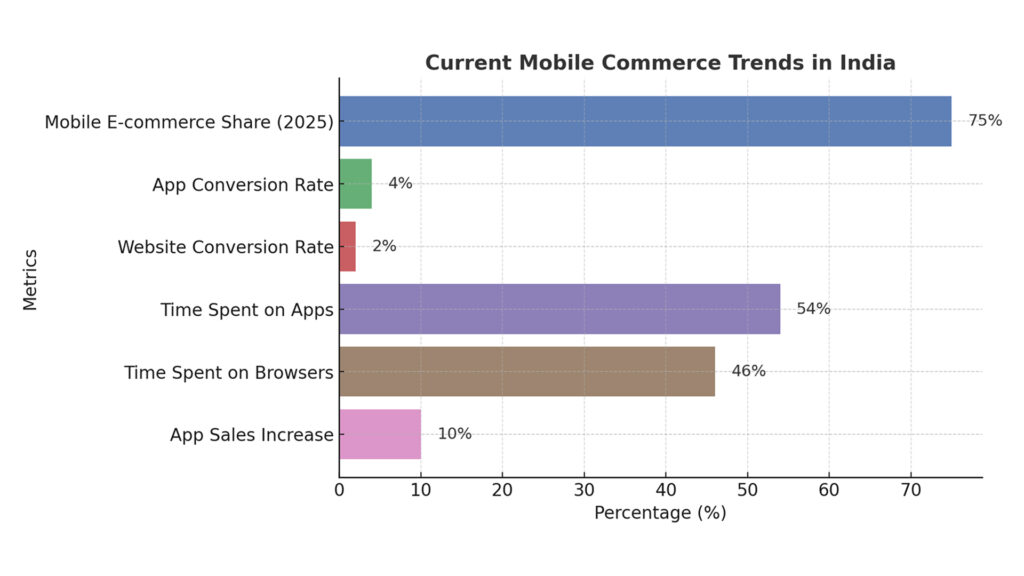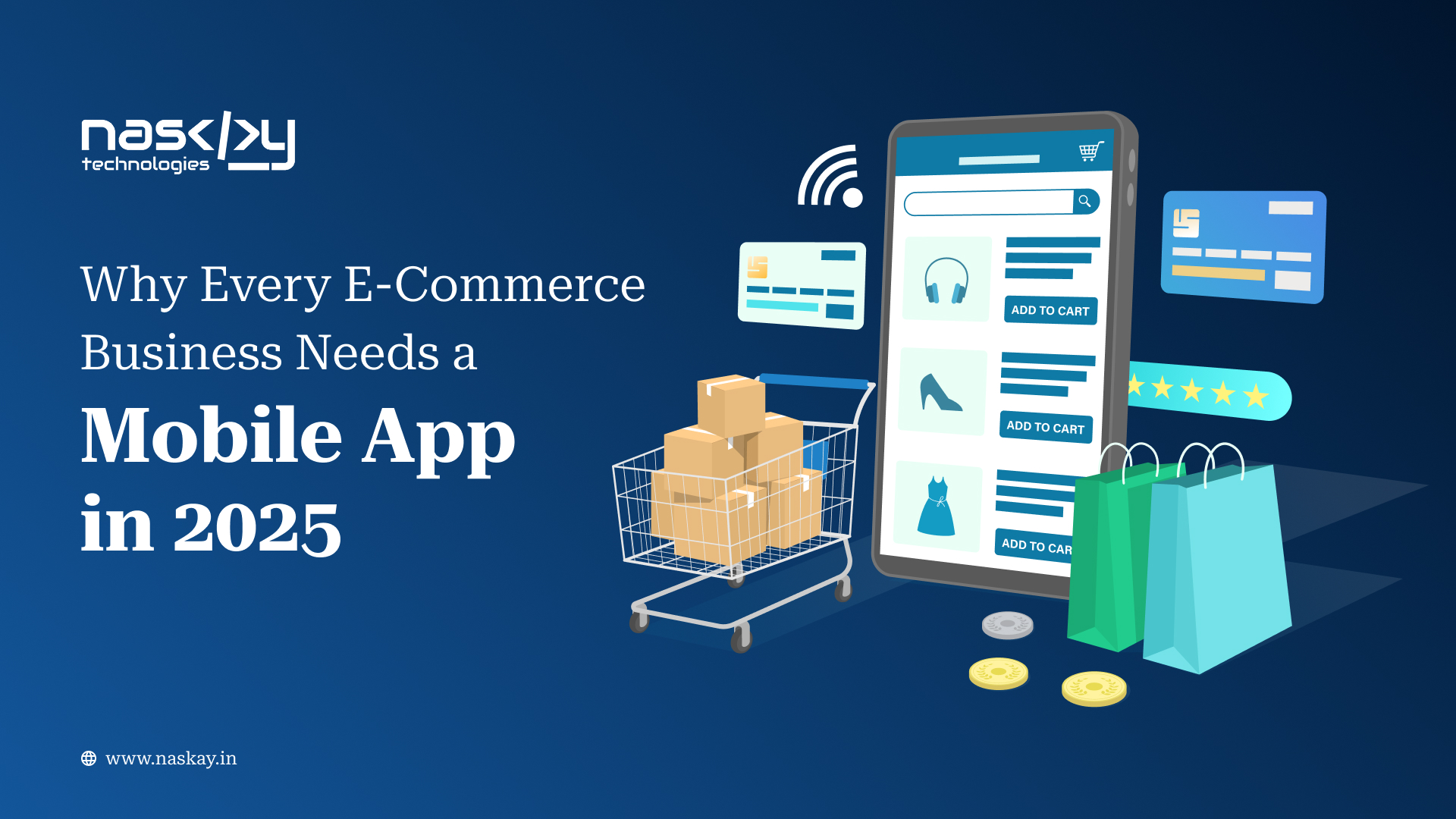E-commerce app development has made leaping strides🚀 in the recent years. With the advent of advancing technology and a fast-paced style of living, people all across the world are taking to novel and efficient ways of shopping. Today’s society is smartphone savvy, and the ownership of a mobile device has become the norm of daily living. Think of anything – a Google search, a glance at your messages, making a to-do list, checking your e-email, food ordering, online shopping – and your smartphone is your saviour. For those looking to flourish, innovate, and forge ahead in the trending e-commerce market, progress and adaptation is necessary, and digitalization, a must. E-commerce mobile apps are the yardstick for gaining the traction you’ve always wanted, whether you’re a budding enterprise or a small startup. If you’re looking for long-term success and profits, look no further; here’s why you need a mobile application for your e-commerce business.
THE CURRENT SCENARIO 🌍 📊

▸ The Indian e-commerce market is a flourishing industry. Mobile shopping is projected to account for about 75% of all e-commerce sales by 2025, with global m-commerce revenue reaching $6.5 trillion.
▸ Mobile commerce trends revealed a sales conversion rate of about 4% for apps, surpassing the 2% value for traditional websites.
▸ According to WiserNotify, it is said that users view 4.2 times more products per session in mobile shopping apps compared to their website counterparts.
▸ With the endless benefits that e-commerce app services provide, about 54% spent their time on these apps rather than on browsers (46%).
▸ In fact, app transactions have accounted for more than 10% higher sales, boosting revenue for business owners exponentially.
E-COMMERCE MOBILE APP BENEFITS 💡
1️⃣ Boosting Sales and Revenue
E-commerce mobile apps are known to draw in more customers, sales and consequently, a higher revenue. Given the convenience of having a smartphone at all times, customers have made shopping just another daily activity on their mobiles. With this increased usage and dependency, it is no wonder that the investment in mobile commerce is evidently a rewarding one.
2️⃣ Refined User Interface
Mobile shopping experience is user-centric. Technology-driven AI has further prodded businesses with advanced analytical logistics in developing robust software, ensuring smooth and streamlined functioning. From quicker loading times to instant checkouts, your customer stays engaged, unlike websites, where the delayed loading could drive them away, leading to more abandoned carts.
3️⃣ Personalization
Unlike traditional shopping sites, e-commerce mobile apps are built on added layers of security and personalization. From tailored suggestions to customized shopping journeys, mobile shopping apps are like a dependable friend we all rely on for recommendations.
4️⃣ Improves Brand Recognition
E-commerce businesses are often required to design a visually appealing, structurally organized, easily navigable, and functioning mobile app if they’re striving for success. This solidifies their reputation and trust among the buyers and increases overall brand recognition.
5️⃣ Heightened User Reach
Picture your app launching on a variety of platforms and gaining unimaginable increase in traction. E-commerce apps have a greater probability of expanding user reach through various product launches and events, all with the ease of engaging push notifications.
6️⃣ Improved Data Security
The levels of encryption that come with mobile software are sturdy enough to handle sensitive data of clients and ensure safety and security. Through the implementation of authentication options like biometric logins and compliance with regulations, further trust in the business can be instilled.
7️⃣ Competitive Advantage
The audience you are willing to serve lies in your capacity and willingness to adapt to their shopping preferences. Since smartphones are portable devices, their handiness makes them the first go-to options for users. Thus, to attract customers to your e-commerce platform, you need to stay current and adapt to the trend.
8️⃣ Enhanced Efficiency
Mobile-first shopping apps leverage efficiency and quality servicing to dedicated customers through collaboration, integration, and automation of inventory tracking and reviewing.
9️⃣ Brand Loyalty
An important strategy that e-commerce mobile apps adopt is the implementation of brand loyalty programs, discounts, and deals. This heightens user satisfaction, leading to higher conversion rates and leaving customers coming back for more.
🔟 Transactional Ease:
Mobile ecommerce apps facilitate effortless payment transactions with a wide array of options like UPI, wallets, debit/credit cards, and cash on delivery.
FUTURE TRENDS FOR MOBILE COMMERCE – A SURGE OR A PLATEAU? 🔮
The future of e-commerce apps is a promising one. Here’s why:
▸ Mobile shopping is expected to surge to booming revenues of $710 billion by 2025, with a 23% growth from 2023. By 2027, it could even cross $2.52 trillion.
▸ By the end of 2026, mobile wallets will handle more than 50% of global online transactions.
▸ Boosting trends will exponentially move with social media popularity scales, with users purchasing more from apps based on influencer recommendations. Statistics tell us that already more than 50% of shoppers have bought something using a social media app.
A STEP INTO A FUTURE: 🚀
The e-commerce mobile app space is trudging ahead, but the limits on technological innovation knows no bounds. Your business could be a step into the future of e-commerce revolutionization.
▸ Augmented Reality (AR) and Virtual Reality (VR)
Would you ever like your customers to visualize your products before purchase or explore virtual stores? Well, this is a bright reality expected to advance in the near future. IKEA’s Place App is already doing it by virtually enabling users to place furniture in their rooms and see how well it fits. You could be the next one soaring to big heights with the growing potential of AR/VR. According to Threekit, it is already surmised that 75% of the global population and almost all smartphone users will be frequent AR users by 2025.
▸ 5G Popularity
According to IHS Markit, 5G could add $1.5 trillion to the global economy, with e-commerce being a major beneficiary.
▸ Voice Commerce
Your voice assistant is no less capable than a personal assistant. Utilizing it to perform product searches and make app purchases are the luxuries your e-commerce app can provide to the customer.
▸ AI and Machine Learning (ML)
With the integration of of AI/ML, consumers can experience 24/7 customer support with chatbots at their beck and call providing tailored recommendations whenever they need it. Inventory management is already optimized, but further improvisations will soon provide infallible analytics.
▸ Blockchain
The success of cryptocurrencies is booming, accounting for about 2% of transactions in 2025.
THE ROLE OF SOCIAL MEDIA IN APP SUCCESS 📸
Most mobile shoppers belong to the 25 to 35 age bracket, which also comprise majority of the social networking population. Social media is an indispensable element of today’s generation. It provides a forum for creating product awareness and popularizing brands. In addition to the aforementioned points, a social media influencer, eponymously, impacts a customer’s thinking and decision in fortifying trust and confidence in a product. According to statistics, around 65% of shoppers said they bought a product because an influencer recommended it. Moreover, the numerous ads on social media help escalate e-commerce app sales, with a 4% rate of turning mere viewers and app users into loyal patrons.
STEPS TO DEVELOPING YOUR OWN MOBILE COMMERCE APP 🛠️
Wanting to start your own app is a rewarding move, but it’s important to appreciate the tremendous effort and time it takes to do so. It’s also pivotal to find the right developer and designer to get the job done. Let’s take a look at the steps of mobile app development dedicated to e-commerce:
1.Goal Setting and Research
Every successful launch involves meticulous planning and a series of goal setting strategies, needing a keen eye and smart planning. It’s imperative to ask yourself- Why do I need this app, and what target audience am I looking for. By understanding key demographics and user preferences, you are putting the customer’s needs first and tailoring an app aligning with their preferences. Studying market trends highlights what a business needs to incorporate during the app development stage. It’s also crucial to assess budget and realistic timelines for the completion of the project.
2. Designing
This involves steps like creating blueprints of the app’s layout (wireframing), prototyping, and quality UI/UX design.
3. Developing
After gathering your ideas, it’s time to put in the hard work. Ensure backend development for handling database collection, data processing, and server management through APIs. Frontend development will aid in constructing a robust UI/UX and ensure seamless experience on the app. Code the application, and integrate reliable payment gateways. In addition, make your app as unique as possible to help stand out among competitors- include essentials like product search, cart, wishlist, account management, and payment processing.
4. Testing
Ensure functional and usability testing by running beta tests. Scout for bugs, and fix them at the earliest. Verify that data security complies with all regulations.
5. Deploying
Once the app’s good to go, it’s time to showcase it on an app store. Employ smart marketing strategies, and consider a soft launch. This helps predict how your app is expected to perform in a real-time setting. Gather feedback, and promptly fix issues, if any. Soon, you’ll realize that in no time, your app is a total hit!
CONCLUSION ✅ 🌟
To sum up, mobile phones, albeit their small size, are fortified pieces of technology. The degree of optimization that a seemingly simple e-commerce mobile app offers is far unparalleled to its website counterpart. Websites are undeniably an integral part of your e-commerce business, creating a digital presence on the internet. However, if you intend on maximizing your online business’s potential, then mobile app development is your answer. Depending on budget, it is therefore vital to choose wisely. Nevertheless, remember that the costs entailed are like a long-term investment in nourishing the fruit of your labour. So, what are you waiting for?
Take that first initiative and sow your seed well; after all, the future of your business essentially lies in your hands🙌— start building today!
